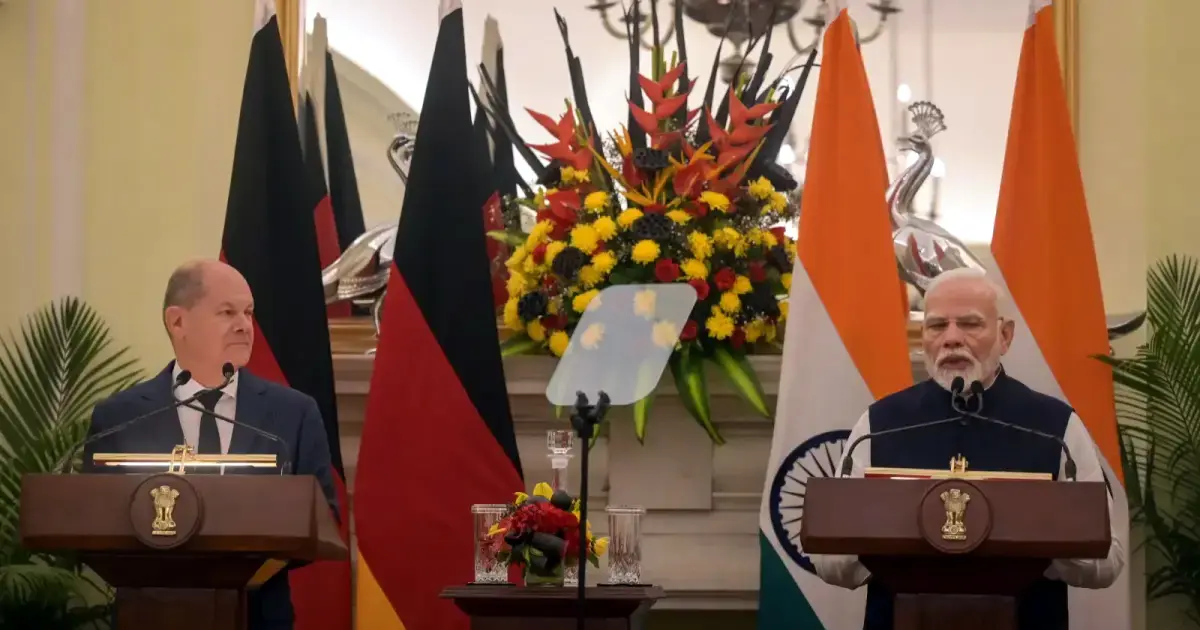Germany wants more skilled labour from India
27 Oct 2024

The seventh round of India-Germany Inter-Governmental Consultations (IGC), held in New Delhi on 25-26 October, under the motto `Growing Together with Innovation, Mobility and Sustainability,’ announced a number of initiatives to strengthen economic, scientific, cultural and defence ties between the two countries.
Germany also announced plans to increase the intake of skilled labour from India amidst a growing shortage of skilled workforce in that country. Germany now has a more liberal visa regime and this is also the first country-specific programme aimed at addressing the issue of people mobility.
Germany, one of India’s most important partners in the EU, is already hosting 50,000 Indian students, which is the largest non-German group in its universities.
Germany and India have also a shared interest in a multipolar world with rule-based international order that upholds democratic principles as well as the reform of the United nations and its multilateral institutions.
Both sides also decided to deepen bilateral security and defence cooperation and to jointly address global challenges.
Presiding over the 7th IGC, Prime Minister Narendra Modi and Chancellor Olaf Scholz appreciated the renewed momentum in bilateral engagement across government, industry, civil society and academia that is basic to India-Germany strategic partnership.
The IGC is being held in parallel to the Asia-Pacific Conference of German Business (APK), taking place in New Delhi.
The 7th IGC placed particular emphasis on technology and innovation, labour and talent, migration and mobility, climate action, green and sustainable development as well as economic, defence and strategic cooperation.
Both countries agreed on a comprehensive partnership across areas like trade, investment, defence, science, technology, innovation, sustainability, renewable energy, emerging technologies, development cooperation, culture, education, sustainable mobility, sustainable resource management, biodiversity, climate resilience and people-to-people ties.
The two countries signed a number of agreements and exchanged documents on collaboration, which included:
The two sides exchanged a number of documents on collaboration in various areas, including:
- A roadmap on Innovation and Technology;
- Research and development of advance materials that would benefit both countries;
- New and emerging technologies;
- Green energy, including the launch of green hydrogen roadmap document;
- Mutual Legal Assistance Treaty (MLAT) in Criminal Matters;
- Exchange and Mutual Protection of Classified Information;
- Green Urban Mobility Partnership-II;
- 2+2 Calls for Advanced Materials under IGSTC;
- Collaboration between Max-Planck-Gesellschaft eV (MPG) and International Centre for Theoretical Sciences (ICTS) of Tata Institute of Fundamental Research (TIFR);
- Collaboration between Max-Planck-Gesellschaft eV (MPG) and National Centre for Biological Sciences (NCBS) of Tata Institute of Fundamental Research (TIFR);
- Innovation and Incubation Exchange Programme between DST and German Academic Exchange Service (DAAD)
- Collaboration between Indian National Centre for Ocean Information Services (INCOIS) and German Research Centre for Geosciences (GFZ) on Disaster Mitigation
- Collaboration between National Centre for Polar and Ocean Research (NCPOR) and Alfred-Wegener Institute Helmholtz Zentrum fuer Polar and Meeresforschung (AWI) on Polar and Ocean Research;
- Collaborative research and development of infectious disease genomics between Council of Scientific and Industrial Research – Institute of Genomics and Integrative Biology (CSIR – IGIB) and Leipzig University;
- Partnership between Council of Scientific and Industrial Research – Institute of Genomics and Integrative Biology (CSIR – IGIB), All India Institute of Medical Sciences (AIIMS), Leipzig University and industry partners in India on Mobile Suitcase Lab for diagnostic purposes;
- India-Germany Managerial Training Programme (IGMTP);
- Cooperation in skill development and vocational education and training;
- Joint declaration of intent on labour and employment;
- IIT Kharagpur and German Academic Exchange Service (DAAD) to implement co-funded joint research programme - German India Academic Network for Tomorrow (GIANT);
- Collaboration between IIT Madras and TU Dresden to establish an intensified partnership known as ‘TransCampus’
Other key initiatives include:
- Placing a German liaison officer in the IFC-IOR;
- German support for India’s Observer status in the Eurodrone programme;
- German projects and funding commitment of 20 million Euros under Indo-Pacific Oceans Initiative (IPOI);
- Regional consultations between the foreign offices of India and Germany (Africa, West Asia and North Africa);
- Millet related projects in Cameroon, Ghana and Malawi and pilot projects in Madagascar and Ethiopia under Triangular Development Cooperation (TDC) framework;
- Launch of GSDP Dashboard; and
- Establishment of first International Research Training Group between India and Germany.
Major events at the IGC include:
- Holding of the 18th Asia-Pacific Conference of German Business (APK 2024); and
- Defence Round Table on the sidelines of the APK 2024 and Indo-Pacific deployment of German Naval ships and joint exercises with Indian Navy and port calls in Goa.
The year 2024 marks the 50th anniversary of the signing of the Inter-Governmental Agreement on Cooperation in Scientific Research and Technological Development which institutionalized the framework of Indo-German cooperation in Science & Technology, research and innovation.


















